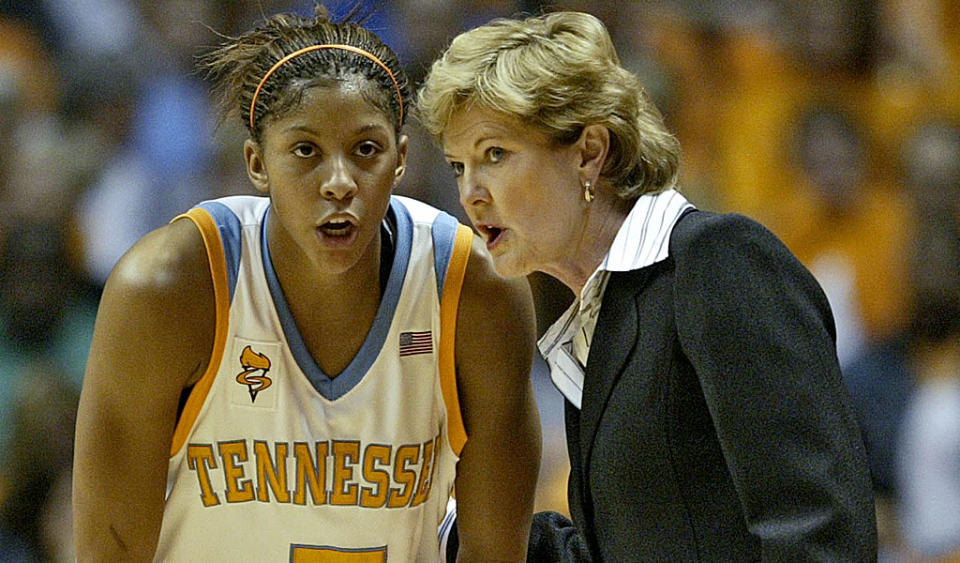Candace Parker, fellow Lady Vols reflect on Pat Summitt

LOS ANGELES — Candace Parker remembers the moment pretty vividly. She remembers the sobs. She remembers the sadness. She remembers the phone call.
It was August 2011. The call was to her college coach, Pat Summitt. Summitt, the winningest coach in college basketball history, had been diagnosed with early onset dementia, Alzheimer’s type. Parker had just heard the news.
“Coach, I’m so sorry,” Parker said through the phone, and through the tears. “I love you. I care about you. I’m here for you.”
Summitt responded as only she could.
“Well don’t throw a pity party,” she told her former player. “Because you’re gonna be the only one there.”
That was nearly five years ago. Summitt, the legendary Tennessee Lady Vols basketball coach, succumbed to Alzheimer’s disease on Tuesday. She was 64.
Hours later, Parker trotted out onto the Staples Center floor, her Los Angeles Sparks moments from tipping off against the Dallas Wings. At the request of the public address announcer, the stadium descended into silence to honor Summitt. Parker’s head bowed toward the floor. Toward her orange shoes. Toward the word “Rebound,” which she’d written on the toe of the right one. That’s what Summitt always used to holler at her.
Perhaps it was fitting, then, that Parker pulled down a season-high 13 boards. She also glided to 31 points and seven assists, and, with her Sparks down 22 in the third quarter, ignited a furious comeback for an 89-84 win.
At the final horn, though, she approached Wings forward Glory Johnson, a fellow Lady Vol. They wrapped their arms around each other, holding the embrace for a few seconds to exchange comforting, reassuring words.
There’s a vast Tennessee network in women’s basketball. A few nodes of that network converged Tuesday night. And it’s almost as if Summitt still oversees the entire web.
“She had 161 young ladies graduate, and basically taught them how to fly,” Sparks assistant coach Tonya Edwards, who won two national championships under Summitt in the late 1980s, said after the game. “Those young ladies will definitely leave their mark. But it will really be her mark. Because she’ll end up living through us.”
Johnson, who wrote her Master’s thesis on her (and Summitt’s) final season at Tennessee, is one of those 161. “There’s no one that will be able to take her place,” Johnson said of her former coach after the game. “It’s just not gonna happen. But she did teach us enough to where we can spread the word, and we can share our knowledge of the game with everyone else.”
Summitt taught beyond basketball too. She was about molding women as much as molding stifling defenses.
“You see the toughness, you see the glare, all that stuff,” Parker said. “But my memory at Tennessee is just sitting in her office, propping my feet up, and just having a conversation in between classes. Her door was always open. Her house was always open. You could stop by there anytime.”
Edwards recalled her first summer after graduating from Tennessee. Okay, I can relax now, she thought. But after showing up late to work at a basketball camp, she returned home to a call from Summitt. “She let me have it,” Edwards said with a smile.
But Summitt had a certain way of crafting her criticism, of delivering tough love, that allowed it to remain just that — love. Sparks assistant coach Amber Stocks, who spent two years with the Lady Vols program as the director of basketball operations, remembers how important this was to Summitt.
“One of the rules that she was very passionate about was never, ever, break a player’s spirit,” Stocks said. “She would get on players, and she would ride them, but she didn’t believe in demeaning them, and degrading, and cussing them out.
“That just wasn’t her character. It was so anti- who she was as a person, that she never even got close to that. The genuine concern, and the investments that she had made into the student athletes over time … when she did motivate somebody, or did have to get on somebody really intense, there was no question that it came from a place of love. Because daily, she was making love deposits into everybody’s life.”
It’s that, more than anything else, that explains why Parker’s heart was so heavy Tuesday night. That explains the shoes. That explains the orange shoelaces worn by all Sparks players. It explains the orange shirts in the crowd, by the scorer’s table, even on media row. It explains the end-of-third-quarter video tribute, with Summitt waving a freshly chopped down net — one of eight.
Summitt also explains the ESPN2 cameras and broadcast team at Staples Center Tuesday night. She explains the sizable crowd. She explains the line of fans — female and male, young and old — patiently awaiting Wings guard Skylar Diggins’ autograph after the game.
“She was the trailblazer for women’s basketball,” Edwards said. “We probably wouldn’t be standing here today had it not been for the foundation that she laid.”
It’s rather poetic then that on the day the legend died, three of her pupils — one player, two coaches — led this 22-point comeback, on national TV, on this stage.
“Pat had her hand on it a little bit,” Edwards said with a muffled laugh. “She probably put a couple of them balls in the basket for us.”

 Yahoo Sports
Yahoo Sports 
